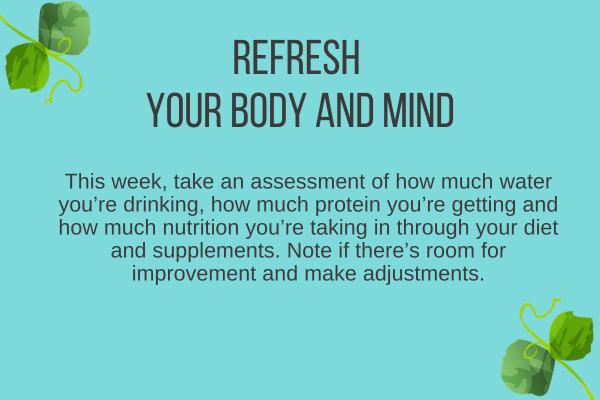Your skin is your largest organ and it plays a vital role in your overall health and wellness.
That said, if we’re honest with ourselves, many of us equate skincare solely with the skin that’s on our face. There’s a reason the beauty industry is a lucrative one! A $150 jar of cream that promises to get rid of fine lines and wrinkles? Sold!
But our skin is more than what’s on our face – it protects what’s inside by keeping water and nutrients in, while keeping harmful bacteria and viruses out. Your skin helps you maintain your body temperature and makes vitamin D when exposed to the sun.
Skin care isn’t only something we need to take care of from the outside – something that we expect a cream to take care of. What we consume also affects our skin.
Here’s a list of some of the essential nutrients you need to keep your skin in top shape so it can play its many fundamental roles and look its very best:
Water:
It’s the main component in your cells and fluids. It allows you to maintain your body temperature and it provides shock absorption for your joints. Your skin has three layers. The outermost layer—the one you see and feel—is called the epidermis. The middle layer is the dermis and underneath that is your hypodermis. When your epidermis doesn’t have enough water, your skin feels rough and loses elasticity. The water your epidermis needs comes from the inside. One clinical study found that when participants who didn’t drink a lot of water increased their intake, their skin became more hydrated and their skin’s “extensibility” improved within 2 weeks. Drinking more water can help skin hydration. The world’s best beauty product is practically free!
Protein:
Your skin is made up of different proteins. For example, collagen and elastin build up the structure of your skin. Over time, your body’s ability to produce collagen decreases. Keratin is another important protein in your skin. Keratin makes up the outer epidermis layer giving it rigidity and enhancing its barrier protection.
The recommended daily amount of protein is based on your body weight. For every 20 lbs you weigh you should try to get at least 7 grams of protein each day. This means a person who weighs 140 lbs needs at least 50 g protein/day, while someone who weighs 200 lbs would need about 70 g protein/day. If you’re active and lift weights, that recommendation shifts to 1 gram per pound of body weight (i.e. 140g if you’re 140 Ibs). Protein is found in meat, poultry, fish, dairy, and eggs. Plant-based sources of protein include soy, lentils, beans, nuts, seeds, whole grains, and even vegetables like corn, broccoli, and asparagus.
I recommend this collagen supplement (you can put it in yogurt, coffee, smoothies, etc.) and this protein powder.
Essential fatty acids:
There are two types of fatty acids that are essential nutrients for our health and our skin – linoleic acid (omega-6) and linolenic acid (omega-3). Omega-3 fatty acids in particular are anti-inflammatory and have been linked to many health benefits including improvements in rheumatoid arthritis, ulcerative colitis, diabetes, heart disease, and psoriasis, to name a few.
A higher intake of linoleic acid is associated with lower levels of skin dryness and thinning as skin ages. On the other hand, a lack of fatty acids is linked to increased water loss from the skin, drying it out and causing weakness in the protective outer barrier.
You can get these essential fatty acids from eating fish (salmon, tuna), shellfish, nuts (walnuts), seeds (flax, chia, pumpkin, sunflower, sesame), leafy vegetables, and avocados. Essential fatty acids are also available in fish oil supplements which may contain additional vitamins and minerals. My favorite is here.
Vitamin C:
Vitamin C is an essential nutrient and has several functions including making other nutrients more absorbable and available. It’s an antioxidant vitamin that plays many roles in your body, including in skin health.
A deficiency of Vitamin C results in skin lesions, as well as skin that is easily bruised and slow to heal. This is, in part, because of Vitamin C’s role in stabilizing the protein collagen. Another sign of Vitamin C deficiency in the skin affects hair follicles and can cause “corkscrew hairs.” These are examples of why Vitamin C is so important for skin health.
Every day you should aim for at least 75 mg of Vitamin C. Fruits and vegetables are rich sources. In particular, bell peppers, citrus fruits (oranges, grapefruits), broccoli, cauliflower, strawberries, kiwis, potatoes, and parsley. If you’re looking for a high-quality supplement, try this one.
Vitamin E:
Vitamin E is a group of essential vitamins called tocopherols. They’re fat-soluble antioxidants that work synergistically with Vitamin C. When given together, vitamins C and E (and zinc) can speed up wound healing. Deficiency of Vitamin E is linked to red, dry skin. This is the reason my brand partner, Shaklee, combines C&E in the same serum.
The recommended daily allowance for Vitamin E (alpha-tocopherol) is 15 mg. You can get Vitamin E in vegetables, olive oil, nuts (almonds, hazelnuts), spinach, broccoli, corn and kiwi.
Skincare Beyond Nutrition
While nutrition is essential, and I’ve covered my top 5 recommendations above, don’t forget other important skin care practices that help protect and nurture your skin:
- Use high-quality skin care products that are free from harmful chemicals
- Use gentle cleansers and warm (not too hot) water to keep skin clean
- Moisturize after taking a shower or washing your hands
- If you have allergies or intolerances (e.g., to gluten or pollen), avoid those
- Limit your sun exposure and use sunscreen as appropriate
- Be physically active
- Try to get enough quality sleep
- Use a humidifier and wear gloves when the weather is dry and cold
- Avoid tobacco

The nutrients you consume feed your whole body—including your skin. And of course, if you have any medical concerns with your skin, see your healthcare professional.
And as always, if you have questions, please don’t hesitate to let me know.

